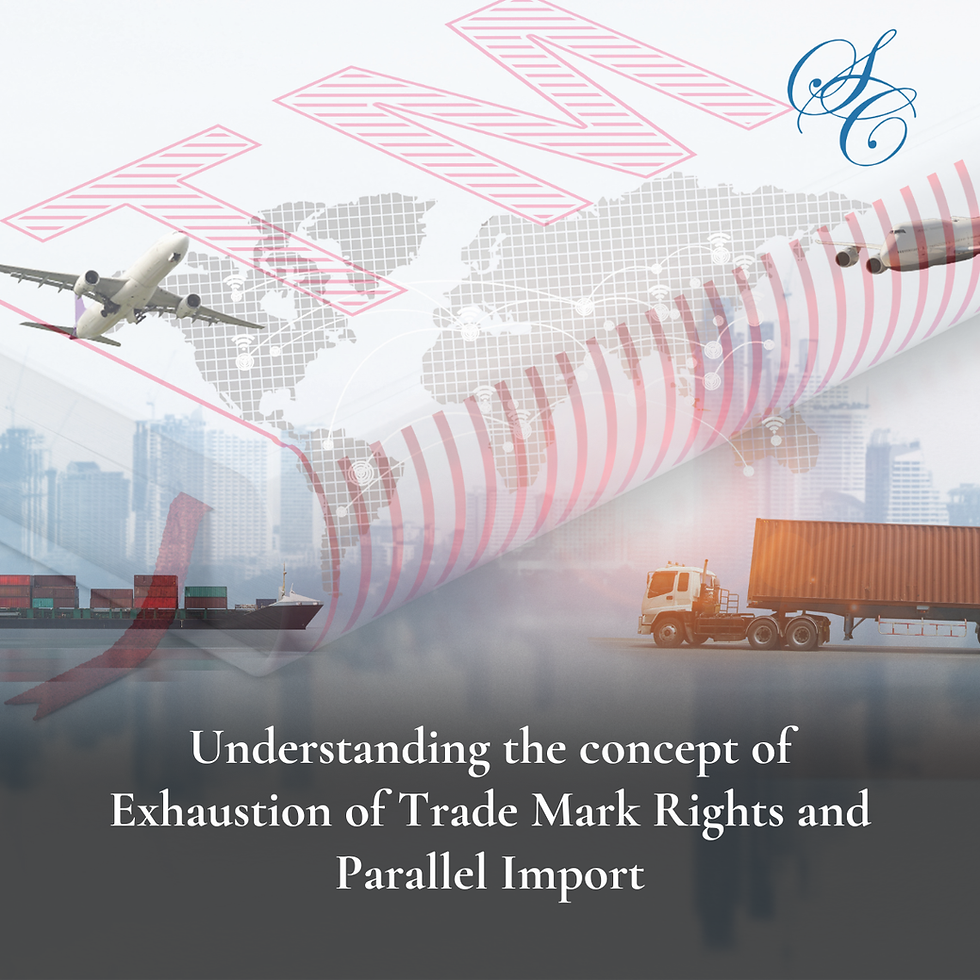Custom Recordation of Intellectual Property in India
- Sarwajeet Singh
- Oct 29, 2018
- 3 min read
With the rapid growth in the counterfeiting industry, law has to step in to prevent it. Indian law has approaches to check the importation and exportation of those counterfeit goods that infringe any intellectual property. One such approach is the custom recordation of an intellectual property, the validity of which is five years. All the types of intellectual property (trademarks, copyrights, patents, design, geographical indications) can be recorded with the customs authority. The procedure to record the intellectual property is dealt under the Intellectual Property Rights (Imported Goods) Enforcement Rules, 2007.
If you are suspicious that goods infringing your intellectual property are being imported into the Indian Territory, you can inform the customs authority by giving them a notice requesting suspension of clearance of such infringing goods.
In order to record an Intellectual Property with the customs authorities in India, you can register through the website of the customs authority. You have to upload the relevant documents as mentioned on the website of the customs authority. The documents that are to be submitted are:
Certificate of Registration for the concerned intellectual property
A Power of Attorney authorizing the person filing the request on your behalf
Statement of exclusivity stating your exclusive rights in the concerned intellectual property
Statement of grounds of suspension mentioning the reasons behind suspension of the infringing goods
Digital images of the genuine goods/product
A general bond (A general bond is an undertaking stating that the right holder has to provide a bond equivalent to 110% of the value of the detained goods along with a security of 25% of the bond value at the time of interdiction)
An indemnity bond (an indemnity bond is an undertaking stating that the right holder shall indemnify the Customs authorities against all liabilities that may be incurred in relation to the detained goods)
Names and Importer-Exporter codes of the authorized importers (not mandatory, but advisable)
Differentiating features between the genuine and the infringing goods (not mandatory, but advisable)
Demand Draft amounting to INR 2000 (the official fee)
Apart from the above-mentioned documents, you are also required to provide a list of countries in which genuine goods are manufactured, a list of countries from which genuine goods are imported into India and a list of those countries from which the infringing goods are suspected to be imported.
Generation of a Unique Temporary Registration Number-
After successful submission of the details and the documents, a Unique Temporary Registration Number (UTRN) is generated. You have to submit the UTRN along with the copies of the uploaded documents to the IPR cell of the relevant Custom House.
Generation of a Unique Permanent Registration Number-
Within 30 days of the submission of the UTRN, you will receive a Unique Permanent Registration Number (UPRN). The custom authorities will then inform you whether the request has been registered or not.
What happens after registration of the request?
Once the request is registered, the clearance of the suspected infringing goods can be suspended by the customs authorities. They will also notify you and the importer about the suspension of the clearance of goods. You are then required to join the proceedings within a period of ten days from the receipt of the notice by the customs authority, which is extendible up to another ten days. In case of perishable goods, the time period for suspension is three to four days. However, in case of failure to join the proceedings within the stipulated time, the customs authority may clear the suspected goods.
Upon joining the proceeding, you may examine the veracity of the suspected goods. Once the goods are examined, if it is found that they infringe your intellectual property rights, the customs authority may destroy the goods. The cost of such destruction and disposal of infringing goods shall be borne by you. The customs authorities further keep a check on the re-exportation or re-importation of such infringing goods.
All of this suggests that custom recordation of intellectual property in India is a hassle-free process and is therefore advisable to circumvent a difficulty like counterfeiting.




Comments